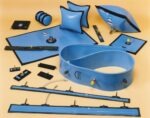DroneShield Selected for LAND 156 LoE 3 Panel
DroneShield Limited has been selected as a supplier for the Australian Department of Defence’s (Defence) Project LAND 156’s Line of Effort 3, which supports the Defence’s strategy to address evolving threats posed by small drones in domestic security. The selection relates to Line of Effort 3, establishing a Counter-small Unmanned Aerial Systems (C-sUAS) Services Standing Offer Panel (Panel). DroneShield’s selection as a Category 2 CsUAS solutions provider on the Panel allows for Defence to procure hardware, software, Command-and-Control software (C2), and all associated support services under a Capability as a Service (CaaS) model. DroneShield is one of a number of parties selected as a provider on the Panel. The Panel is available for Defence as a means of engaging domestic site planning and support services. Selection on the Panel does not guarantee contracts. Under the Panel, each of Defence’s base, or groups of bases, will be assessed and tendered by their appropriate authorities with specific requirements. This arrangement enables Defence to procure counter-drone solutions for Defence and other Whole of Government sites as a service after suitable assessment, streamlining contract opportunities and accelerating deployment timelines. As noted by the Australian Minister for Defence Industry, the Hon Pat Conroy MP, the Australian Government has set aside $1.3 billion for the acquisition of counter-drone capabilities over the next 10 years, highlighting the strategic importance of this domain and of Project LAND 156. Oleg Vornik, Chief Executive of DroneShield said, “We welcome the opportunity to support Defence through this Panel arrangement and stand ready to deliver battle-proven, software-defined C-sUAS solutions.” AIRCDRE (Ret’d) Terry Van Haren DSM, Vice President Strategy of DroneShield said, “The growing threat from small drones demands practical, tested solutions to safeguard Defence bases and critical assets. We encourage Government and Defence stakeholders to take advantage of this Panel arrangement to […]










